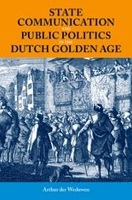State Communication and Public Politics in the Dutch Golden Age
Abstract
This monograph describes the political communication practices of the authorities in the Dutch Golden Age. It is an in-depth study of early modern ‘state communication’: the manner in which government sought to inform its citizens, publicise its laws and engage publicly in quarrels with its political opponents. These communication strategies, including proclamations, the use of town criers, and the printing and affixing of hundreds of thousands of edicts, underpinned the political stability of the seventeenth-century Dutch Republic. The oligarchic regents who ruled the country always understated the extent to which they relied on the consent of their citizens. The regents shared a republican ideal which dismissed popular agency; yet far from withholding political information, the authorities were finely attuned to the benefit of involving their citizens in the affairs of state. Based on systematic research in thirty-two Dutch archives, this book demonstrates for the first time how the wealthiest, most literate and politically participatory state of early modern Europe was shaped by political information. It makes a decisive case for the importance of communication to the relationship between rulers and ruled, and the extent to which early modern authorities relied on their subjects to legitimise their government.
Keywords
Dutch Republic Netherlands Politics Printing Seventeenth Century Proclamations Republicanism Law PamphletsDOI
10.5871/bacad/9780197267431.001.0001ISBN
9780197267431, 9780198888857Publisher
Oxford University PressPublisher website
https://global.oup.com/Publication date and place
Oxford, 2023Grantor
Series
British Academy Monographs,Classification
European history
History and Archaeology
c 1500 onwards to present day
Society and culture: general
Netherlands


 Download
Download Web Shop
Web Shop